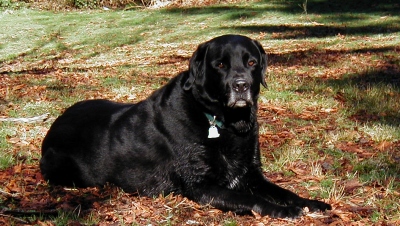Such a Good Boy: Crom [1991-2004]

Crom posing, as he would on demand, one late afternoon in Stanley Park, Vancouver, B.C.
His name was Crom, but I called him other things over the years as well. "Dogboy," "Soupy," "Patous" — the last some inexplicable faux Cajun endearment that often became "'Tee Patous." He was "Swee' Pea" to me and "Handsome" to his vet.
My son, who referred to him as "my little black brother" and outweighed him by at most thirty pounds, called him "Kid." My stepdaughter called him "Cromster" and "Cromula," but not to his face. Women who knew him called him "Crommie." I explained his name, during introductions, as "like Cromwell," but it wasn't. I would call him "Babe" during our conversations on walks, and one day a stranger asked if I named him for Paul Bunyan's blue ox. He weighed 135 pounds.
His name was Crom, for my childhood obsession with Conan, fueled and revived by a recent movie. In our imagined conversations, he called me "Pop," more a term of respect and endearment than a description of our relationship. We were friends, companions, codependents. Perhaps I had most of the power and all the money (and the danged opposable thumbs), but I was his child as much as he was mine. We grew, and grew old, together. And we loved each other. I am an educated, sensible man, not given to romantic fantasies like anthropomorphism, but there was no question that he would have given his life for me, and I for him. Now he is dead, and I'm not, so this memorial.
This area of the Dancing Badger website will be the repository of memories and observations. It includes links to essays I've written about him and a gallery of photographs I put up two years ago for his friends. I want to write about our life together, what he taught me — about intelligence, about love, about respect for our four-legged brothers and sisters, about living as one species among many. His example taught me that we might aspire to live like dogs, and the world would be better for it.
I've been accused of "elevating" animals to the level of humans; this is an "accusation" because it is always described, inexplicably, as "demeaning" or "trivializing" human beings. This first time I ever did it, I was sixteen and my mother had announced, in the heat of an argument, that I obviously thought "we were no better than animals." I said, in effect, "I've know some pretty good animals. What's wrong with that?" She played her trump card, retreating to the bathroom to have hysterics. She never answered my question. Nor has anyone else.
Animals better than people? If I think so, it's beside the point, which is that people are not "better" than animals. But that is an argument for another time and place.

A friend, after meeting Crom, told me what he called a favorite prayer: "Lord, help me be the man my dog thinks I am." There is much we could learn about "being human" by studying animals, who seldom match homo sapiens for sheer "inhumanity." Perhaps these pages will help you see how I came to think so, and perhaps they will persuade you to agree. That is not their purpose, though. They are a memorial to a life well lived by a creature of great goodness. To the degree that I tell you who Crom was, they will be successful.
Contents

- In Memoriam: Crom – Introduction
- Our First Years: Sharing Education
- Dog Humor: By, and About
- The Sacred Bunny: Regarding Toys
- Crom's Death: A Sudden Nightmare, March 23, 2004
- Cautery: Finding Link
- Link's Walk: Some Dog-Walking Tips
- Next Year: March 23, 2005
- Dog Wits and Bird Brains–Essays on Animal Intelligences
- Crom's Own Pages–A Tribute to True Love
- Table of Contents — Dogs and Other Creatures